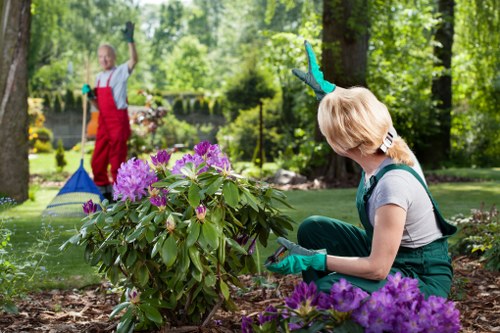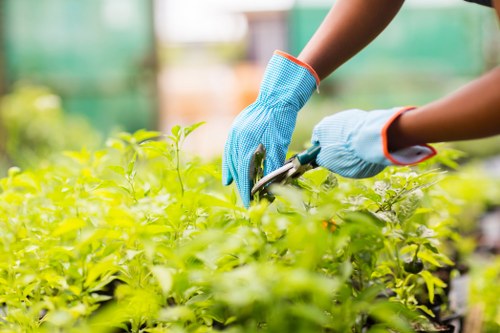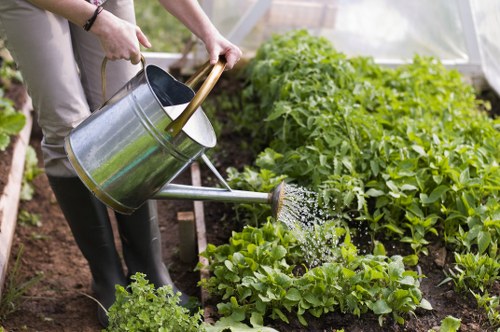Garden Maintenance in East Ham: Keeping Your Outdoor Space Pristine
Introduction to Garden Maintenance

Maintaining a beautiful garden requires dedication, knowledge, and the right tools. In East Ham, garden maintenance is essential for preserving the aesthetic appeal and health of your outdoor space. Whether you're a seasoned gardener or a beginner, understanding the fundamentals of garden upkeep can transform your yard into a serene retreat.
East Ham's climate and soil conditions present unique challenges and opportunities for garden enthusiasts. From managing seasonal changes to selecting the best plants, effective garden maintenance strategies are crucial for thriving green spaces.
In this article, we'll explore comprehensive garden maintenance tips tailored specifically for East Ham residents. Discover how to keep your garden lush, vibrant, and well-organized throughout the year.
Seasonal Garden Maintenance

Seasonal changes significantly impact garden health and appearance. Adapting your maintenance routine to the seasons ensures your plants remain healthy and your garden looks its best year-round.
Spring Maintenance
Spring is the perfect time to rejuvenate your garden. Start by clearing debris and preparing your soil for new plantings. Prune any dead or overgrown branches to promote healthy growth.
Planting and Sowing
Introduce spring-flowering plants such as tulips, daffodils, and daisy. Consider planting annuals and perennials that thrive in East Ham's climate, providing color and structure to your garden.
- Remove winter debris
- Prune shrubs and trees
- Soil aeration and fertilization
Summer Garden Care

Summer brings warmer temperatures and increased sunlight, which are ideal for plant growth but also require diligent maintenance to prevent issues like wilting and pest infestations.
Watering Strategies
Proper watering is essential. Deep, infrequent watering encourages strong root systems, while overwatering can lead to root rot and other problems. Install a drip irrigation system for efficient water distribution.
Pest Management
Inspect your plants regularly for signs of pests. Use natural remedies and organic pesticides to maintain a healthy garden without harming beneficial insects.
- Schedule regular watering
- Monitor for pests and diseases
- Support plants with mulch
Autumn Garden Preparation

As temperatures drop, it's time to prepare your garden for the winter months. Autumn maintenance helps your garden survive the colder season and emerge stronger in spring.
Leaf Management
Regularly raking and removing fallen leaves prevents fungal growth and maintains garden hygiene. Composting leaves can provide valuable nutrients for your soil.
Plant Protection
Protect sensitive plants by mulching and covering them with protective materials. Prune perennials to prevent breakage and disease.
- Rake and compost leaves
- Mulch garden beds
- Prune and protect plants
Winter Garden Maintenance

Winter requires a different approach to garden maintenance. While plant growth slows, maintaining your garden's structure and preparing for the next growing season is essential.
Tool Care
Clean and store gardening tools properly to prevent rust and damage. Sharpen blades and apply protective coatings to extend their lifespan.
Planning for Spring
Use the winter months to plan your garden layout, select new plants, and order seeds. A well-thought-out plan ensures a successful gardening season ahead.
- Clean and store tools
- Plan garden layout
- Select and order seeds
Essential Garden Tools and Equipment
Must-Have Tools for Every Gardener
Investing in quality garden tools can make maintenance tasks easier and more efficient. Here are some essential tools every East Ham gardener should have:
- Hand Trowel: Perfect for planting and transplanting.
- Pruning Shears: Essential for trimming and shaping plants.
- Garden Fork: Ideal for aerating soil and turning compost.
- Rake: Useful for collecting leaves and leveling soil.
- Watering Can: Necessary for manual watering, especially for delicate plants.
Advanced Equipment
For more extensive garden projects, consider investing in advanced equipment like lawnmowers, hedge trimmers, and irrigation systems to enhance efficiency and productivity.
Choosing the Right Plants for East Ham
Climate-Appropriate Plant Selection
Selecting plants that thrive in East Ham's climate is crucial for a successful garden. Consider factors like temperature, rainfall, and soil type when choosing your plants.
Perennials vs. Annuals
Perennials offer long-term beauty and require less maintenance, while annuals provide vibrant, seasonal color. A mix of both can create a dynamic and resilient garden.
- Perennials: Lavender, hostas, and peonies.
- Annuals: Marigolds, petunias, and zinnias.
- Hardy Shrubs: Boxwood, hydrangeas, and azaleas.
Soil Health and Fertilization
Understanding Soil Composition
Healthy soil is the foundation of a thriving garden. Understanding your soil's composition helps in selecting appropriate plants and fertilizers.
Soil Testing
Conduct a soil test to determine pH levels and nutrient content. This information guides your fertilization strategy, ensuring your plants receive the necessary nutrients.
- Test soil pH and nutrient levels
- Amend soil based on test results
- Use organic fertilizers to enrich the soil
Pest and Disease Management
Identifying Common Garden Pests
East Ham gardens can attract various pests that threaten plant health. Early identification and management are key to preventing extensive damage.
Organic Pest Control Methods
Utilize eco-friendly pest control methods such as introducing beneficial insects, using neem oil, and implementing physical barriers to protect your plants.
- Monitor plants regularly for signs of pests
- Encourage natural predators like ladybugs
- Apply organic treatments as needed
Lawn Care Tips for East Ham
Maintaining a Healthy Lawn
A well-maintained lawn enhances your garden's overall appearance. Proper lawn care involves mowing, fertilizing, and controlling weeds.
Mowing Techniques
Set your mower to the appropriate height to promote deep root growth and reduce weed competition. Avoid cutting more than one-third of the grass blade at a time.
- Mow regularly during the growing season
- Use sharp mower blades
- Leave grass clippings to decompose naturally
Garden Lighting and Aesthetics
Enhancing Your Garden with Lighting
Garden lighting not only adds beauty but also enhances safety and usability during evening hours. Choose lighting that complements your garden's design.
Types of Garden Lighting
Consider various lighting options such as solar lights, LED fixtures, and spotlights to highlight features like pathways, plants, and water features.
- Install path lights for safe navigation
- Use spotlights to accentuate focal points
- Incorporate ambient lighting for mood
Mulching: Benefits and Techniques
Why Mulch Your Garden
Mulching offers numerous benefits, including moisture retention, temperature regulation, and weed suppression. It also enhances the visual appeal of garden beds.
Types of Mulch
Organic mulches like wood chips, straw, and compost improve soil structure, while inorganic mulches such as gravel and rubber provide long-lasting coverage without decomposing.
- Choose mulch based on garden needs
- Apply a 2-3 inch layer around plants
- Replenish mulch periodically
Pruning and Trimming Techniques
Keeping Plants in Shape
Regular pruning promotes healthy growth and prevents overgrowth, ensuring your plants and trees look their best. Proper techniques vary based on plant type.
Tools for Pruning
Use the right tools such as pruning shears, loppers, and saws to make clean cuts and minimize damage to plants. Sterilize tools to prevent disease spread.
- Prune during the appropriate season
- Remove dead or diseased branches
- Shape plants to encourage airflow
Composting and Soil Enrichment
Creating Sustainable Compost
Composting is an eco-friendly way to recycle garden waste and enrich your soil. It provides essential nutrients that promote robust plant growth.
Composting Methods
Choose between aerobic and anaerobic composting methods. Maintain the right balance of green and brown materials to accelerate decomposition and produce high-quality compost.
- Collect kitchen scraps and garden waste
- Turn compost regularly to aerate
- Use finished compost to amend garden beds
Irrigation Systems for Efficient Watering
Choosing the Right Irrigation System
An efficient irrigation system ensures your garden receives the right amount of water without wastage. Options range from manual watering to automated systems.
Drip Irrigation vs. Sprinklers
Drip irrigation delivers water directly to the plant roots, reducing evaporation and runoff, while sprinklers provide broader coverage suitable for lawns and larger garden areas.
- Assess garden size and plant types
- Install timers for automated watering
- Regularly check for leaks and maintenance needs
Creating a Sustainable Garden
Eco-Friendly Gardening Practices
Sustainability in gardening promotes environmental health and reduces your ecological footprint. Implement practices that support biodiversity and conserve resources.
Native Plants and Biodiversity
Incorporate native plants to support local wildlife and ensure better adaptation to East Ham's climate. Diverse plant species enhance garden resilience and beauty.
- Choose native and drought-resistant plants
- Create habitats for pollinators
- Use organic fertilizers and pest control
Conclusion

Effective garden maintenance in East Ham involves a combination of seasonal care, proper tool usage, and sustainable practices. By following these guidelines, you can ensure your garden remains a thriving and beautiful space throughout the year.
Whether you're tending to flower beds, maintaining your lawn, or managing pests, consistent effort and informed strategies are key to success. Embrace the joy of gardening and transform your outdoor area into a personal oasis.
Ready to elevate your garden? Contact us today to schedule professional garden maintenance services tailored to your needs.

